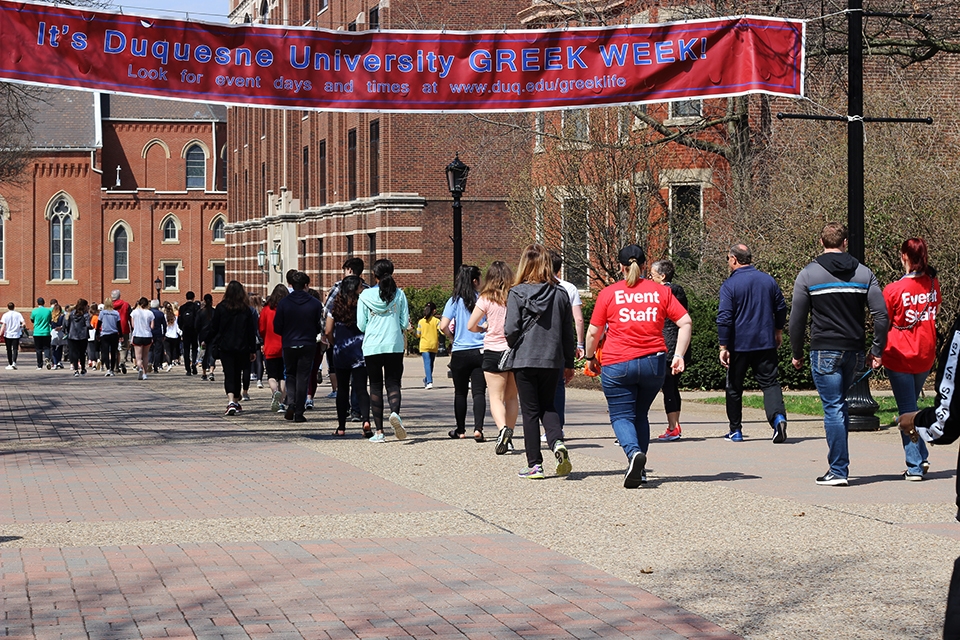

04/11/2019
Krystina Primack / Staff Writer
According to the most recent data available from the Centers for Disease Control and Prevention, suicide was responsible for 47,173 deaths in the U.S. in 2017, which is approximately one suicide every 12 minutes. The CDC states that “[Suicide] is the second leading cause of death for people 10 to 34 years of age, the fourth among people 35 to 54 years of age, and the eighth among people 55 to 64 years of age.” Additionally, the National Institute of Mental Health reported in 2018 that 1 in 5 people in the U.S. are diagnosed with a mental illness, and as such, they are that much more prone to experiencing suicidal ideation and attempting suicide.
The American Foundation for Suicide Prevention has a goal to reduce the annual rate of suicide by 20% in the U.S. by 2025, and part of their effort to reach this goal is to host walks in different cities to fundraise and increase awareness for this cause. They do so through the Out of Darkness Campus Walk. This year on April 6, the walk held here at Duquesne was the first event to kick off the yearly Week of Wellbeing, both of which were coordinated by campus organizations such as Active Minds and the Wellbeing Club, as well as contributions and participation from other organizations such as The Gender Forum, Gender + Sexuality Allince, Students Against Sexual Violence, Psy Chi/Psychology Club, Duquesne’s chapter of The Buddy Project and other Pittsburgh organizations outside of our university.
Launched in 2010, Out of Darkness Campus Walks aim to raise awareness for mental illness and suicide prevention. The organization’s website states, “We fund research, create educational programs, advocate for public policy, and support survivors of suicide loss.” Whether a student wants to reach out to family, friends or the community, or if they need access to these kinds of resources themselves, the American Foundation for Suicide Prevention functions to address a variety of concerns.
Nikki Purwin, a sophomore speech-language pathology major, and Out of Darkness committee chair for this year, reflected on the importance of the walk, and the personal connections she has to the cause.
“I wanted to take on the role of walk chair because I have such a passion for mental health awareness and suicide prevention education. I’ve personally struggled with depression, anxiety, ideation, etc. since I was a little girl. I lost a close friend to suicide in 2015, and several people I know have survived attempts.”
Purwin went on to describe the relevance of suicide awareness and prevention efforts.
“We probably all have a friend or a friend of a friend that connects us to this cause,” she said, “I think this is an excellent way to start off Week of Wellbeing …it’s a visual spectacle of hundreds of people making it known that mental illness is real and suicide prevention education is critical.”
Similarly, Brandi Alexander, a senior sociology major, president of Active Minds, and Out of Darkness committee member, said of the event, “Some of the benefits…[are] the support and awareness it brings to the college community…Suicide and mental illness strikes anyone, and college students are very susceptible.”
Purwin described the urgency that inspired these organizations to come together for this year’s campus walk.
“[We] need to make noise before somebody dies or hurts themselves. Mental health is overlooked in college students, and that needs to change. People dismiss how students feel as stress over academics or professional matters, but the truth is so many people are battling demons and won’t talk about it. We need support. Not just from students but from faculty and administration. It’s not enough to just encourage people to seek help, we have to be active and set an example. We need to be unafraid to say the word suicide when somebody on campus dies unexpectedly. Once we say the word and start talking about the hard stuff, we take back the power and begin healthy conversations that can lead to healing.”
Sophomore psychology major and Out of Darkness planning committee member Katie Patrizi also notes the importance of hosting awareness raising events on college campuses.
“Not only is there stigmatization surrounding any mental health issues,” she said, “but over 25% of college students have been treated and diagnosed by a professional. Imagine how many haven’t spoken up and are struggling in silence. It opens up a conversation and normalizes it.”
Alexander can attest to the importance of opening such conversations and bringing up sensitive issues.
“The walk and the funds raised from it provide research and classes that help bring awareness to the subject many try to keep private. Events like this also bring to light the key issues surrounding suicide and help eliminate the negative stigma attached to it,” she said.
Vanessa Llewellyn, a freshman English and secondary education major and recruitment coordinator for Students Against Sexual Violence, described the event, now in its second year of running, as being inspired in part as a way of talking about issues of sexual violence and the resulting trauma “that is so commonly swept under the rug,” adding, “We believe it is vital to bring this uncomfortable topic into conversation to create change.”
The American Foundation for Suicide Prevention operates largely under their statement: “The best way to prevent suicide is through early detection, diagnosis, and treatment of depression and other mood disorders.”
As Nikki Purwin noted, “We lose our loved ones to an unfortunate and preventable tragedy. By hosting an American Foundation for Suicide Prevention walk we can help spread that message and hopefully save lives…We had a student come up to us during clean-up after the walk. They weren’t at the event but told us they lost their friend to mental illness and were so grateful we were having an event like this to bring awareness. That one person made the event all the more worth it. The expression on their face said it all: the people who support the cause are there they just need to be given an opportunity to be heard.”
Living with a mental illness or coping with harmful thoughts can feel very isolating, and addressing matters of mental illness and suicidal ideations can seem daunting, but they must be taken seriously and handled accordingly. Everyone deserves to be heard and receive help, and it is important to remember that help is available, and that the stigma surrounding mental illness and suicide can end with this generation.
You are not alone. If you are in crisis, please call the National Suicide Prevention Lifeline at 1-800-273-TALK (8255) or contact the Crisis Text Line by texting TALK to 741741.



